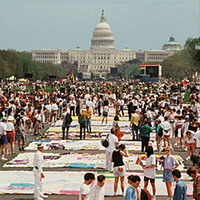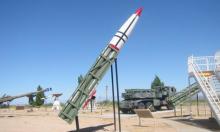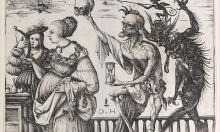Citizens from Northern Ireland to participate in Smithsonian Folklife Festival
Two murals of Northern Ireland being painted on the U.S. National Mall over the next two weeks tell a new story about the territory.

More than 160 performers, artists and regular citizens from Northern Ireland have traveled to Washington to participate in the Smithsonian Folklife Festival. They are using art, music, sports, food and even Irish whiskey to showcase their homeland as it works to heal communal divisions following four decades of bloodshed. A new power-sharing government between Roman Catholics and Protestants was formed in May.
"I wanted to be part of that," said Rachel Sinnamon, one of the muralists, "to show how far we've come and to show it's not all terrorism and bombs anymore."
Northern Ireland joins the "Roots of Virginia Culture" and Asia's Mekong River region as the focus of the 41st annual festival, which began Wednesday and stretches seven city blocks between the U.S. Capitol and Washington Monument. It is one of the largest festivals put on by the Smithsonian Institution with 708 guest artists and participants who speak 32 different languages.
The nearly $6 million (4.4 million EUR) festival runs through Sunday and again from July 4 through July 8. It is free of charge and typically draws more than 1 million visitors each year.
In the Northern Ireland section, a peace mural being replicated from one painted in Londonderry will feature colorful squares and a white dove in the center. On the other side of the three-story wall, artists are painting a black and white mural depicting Belfast industry, from the shipyard workers who built the Titanic to linen workers and the city's skyline.
Murals took on political and militant messages in Belfast in the 1960s and 1970s, with some depicting hooded gunman or hunger strikers. They continue to draw curious tourists, but Sinnamon and others are painting over those murals with images of Protestants and Catholics coming together.
That idea of reconciliation is a broad theme at the festival, which highlights the Mekong region's history of conflict and the Vietnam War, and Virginia's volatile history involving English settlers, African slaves and Native Americans.
"For Americans, when you say Mekong, most people immediately say Mekong Delta and think of the war 30 years ago," said Richard Kennedy, a co-curator of the festival's Mekong section. "It's a very, very different world now. Vietnam and China have opened up greatly to the international community."
Hundreds of participants and translators from Cambodia, Laos, Thailand, Vietnam and the Yunnan province of China are featured in "Mekong River: Connecting Cultures." They bring music, dance and "some silk weaving that is absolutely world-class," said festival director Diana Parker.
The Virginia program takes center stage to coincide with this year's 400th anniversary of the founding of Jamestown. It includes a delegation from Kent County, England, which sent over the first settlers in 1607, as well as eight American Indian tribes and West Africans representing the state's black history.
"Fifty years ago, you wouldn't have seen me here," said Stephen Adkins, chief of Virginia's Chickahominy Tribe. "We here in America have come a long way in appreciating diversity."
But the depiction of Northern Ireland does not come without some opposition. An Irish-American group in Boston objected to the inclusion of two historians from the Orange Order, a Protestant group known for its controversial marches through Catholic neighborhoods.
As a compromise, the Smithsonian pledged to invite another historian with a Catholic perspective, Parker said. Still, she said both Catholics and Protestants from Northern Ireland have embraced the festival program.
"This celebration couldn't happen at a better time in our history," said Martin McGuinness, Sinn Fein deputy leader and a veteran commander of the Irish Republican Army, which tried to sever Northern Ireland's ties with Britain. He now shares power with Protestant leader Ian Paisley.
"We are a society in transformation," he said to cheers at the festival's opening. "The war is well and truly over."
Subscribe to Pravda.Ru Telegram channel, Facebook, RSS!





